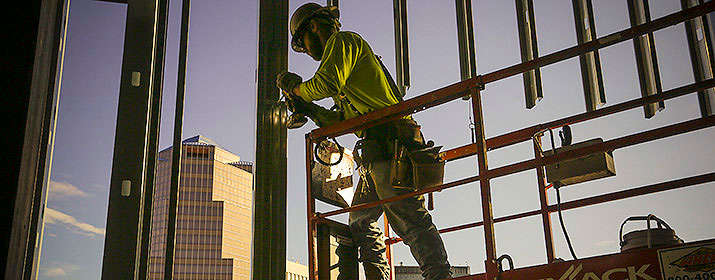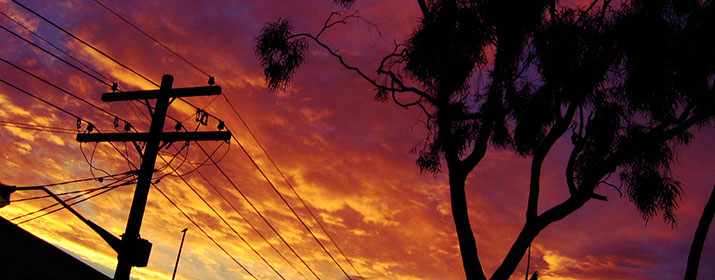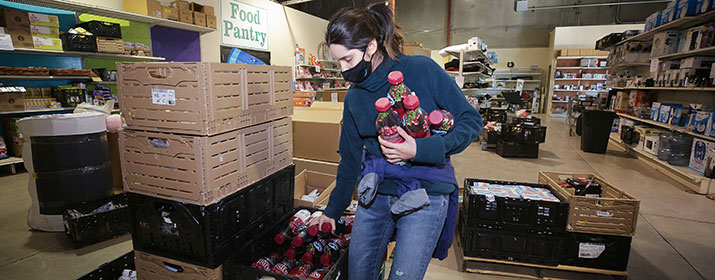
Keeping your workplace safe protects your employees and customers from injury and electrical hazards. It also makes sure that your business, organization or school can stay open and run in an efficient manner.
When planning repairs, maintenance or construction projects – regardless of size or complexity – there are key factors that you should consider beforehand to ensure safety around electricity.
“Take the time to plan ahead, from start to finish, to avoid on-site hazards and make sure the project is safe,” said Josh Necas, a Transmission and Distribution Supervisor who oversees overhead and underground protection. “Safety has to be the highest priority.”
Overhead Considerations
Look out for power lines overhead before doing any work up high. Be mindful every time you climb a ladder, extend a cleaning tool, work on a roof or trim a tree. Keep materials, tools, limbs and foliage and all parts of your body a safe distance from overhead power lines at all times. Find additional details about safe distances and working around higher voltages and cranes on the TEP website.
Some businesses run into trouble on seemingly simple activities.
“When people are distracted or not paying attention, they’re most at risk of hitting power lines and facilities,” said Roger Hall, Transmission and Distribution Manager who oversees a team that responds to public safety incidents, which sometimes knock out power to surrounding areas.
Semi-trucks, and particularly dump trucks or large cranes, have run into lines when loading or unloading items. For example, TEP had to shut down power when a dump truck became entangled with overhead communication lines. The truck never touched electric lines and the driver was extracted safely.
Businesses stacking materials or boxes under power lines have to make sure they don’t get too close. The same holds true when an employee goes up a scissor lift or a scaffold and approaches a line.
TEP is here to help.
If you have questions or concerns about working around overhead or underground power lines, or if your project requires you to get close to our equipment, contact TEP’s New Service Line at 520-918-8300 to schedule a service disruption or fill out an online form. A TEP employee will come out within a day or two to review what needs to be done.
There also is no cost to temporarily suspend electric service while trimming trees. Learn more about vegetation management. If more extensive moves or changes are required, TEP will discuss any necessary fees, Necas said.
In addition to protecting other people, it’s best to make the call to avoid project delays.
“We’ve had to stop jobs completely,” Necas said. “As our employees drive around the city, they’ll call us if they see a contractor working too close to our facilities. We’ll shut a job down until we can make it safe for them, which could cause a delay.”
Underground Risks
Be aware of what’s underground before digging or building.
Call 811 or 1-800-STAKE-IT (1-800-782-5348) at least two working days before starting work. It’s a free service, and it’s required by state law. A worker will come to check if there’s any underground equipment – power, sewer or gas lines – that might be in the way.
Also, any work must steer clear of power poles to ensure their stability. There are many factors to determine when protection is needed on TEP facilities. A simple ratio of two and a half feet of horizontal distance from a pole or anchor to one-foot of depth can be applied. However, not all poles are the same, so it’s best to ask TEP take a look at it first.
“The safety of employees, the public and contractors is paramount,” Necas said. “That’s the most important thing to take into consideration.”
Equipment Checks
Indoors and outdoors, it’s important to be aware of several steps when doing upgrades, repairs or maintenance.
Check cords on power tools, lights and plugs to make sure they aren’t frayed, broken or weathered to avoid damage or shocks.
If you are doing work on anything electrical, such as fixing an overhead lamp or an outlet, turn off the main switch or circuit breakers and test with a meter to ensure wires are de-energized before working on them to avoid fire, shock or even electrocution.
Get your wires checked by a qualified technician if you notice anything odd, like fuses blowing often or items not functioning as well as they should.
No matter what, take the time to keep your customers and employees safe. “The last thing we want is for anyone to get hurt on our system,” Necas said. “It’s really what it’s all about.”






